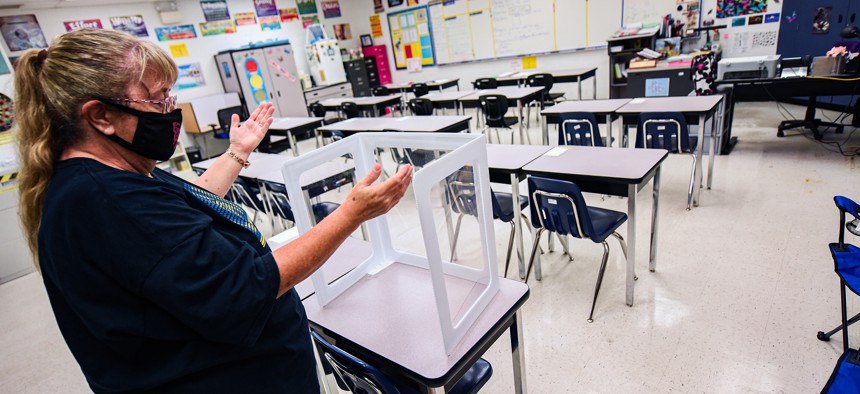On the edge: Florida teachers struggling with burnout in the classroom
With increased pressure from the pandemic and the culture wars, some educators are at the breaking point.

In this file photo, teacher Darlene Huntley shows how student desks were fitted with barriers last year at Lyman High School in Longwood. Photo by Paul Hennessy/SOPA Images/LightRocket via Getty Images
The COVID pandemic. Culture wars. Lower pay.
Those are some of the reasons Florida public school teachers continue to leave the profession. Teachers say those pressures lead to exhaustion and burnout, extinguishing the passion they had when they entered the classroom. Others cite dwindling support from parents and politicians in light of the state’s burgeoning parents’ rights movement, spearheaded by groups such as Moms for Liberty. Still other educators say the pay is too low for a job that requires ongoing training despite recent efforts to boost salaries.
City & State spoke with some South Florida teachers to take the temperature of those with the will to keep going. For example, Shawn Cerra – a former principal of Taravella High School in Coral Springs and now director of athletics and student activities for Broward County Public Schools – says he believes good and open leadership is important to teachers’ mental health. He also believes that teachers need to be able to trust their school district’s administration. “I think the most important thing is the culture of the campus or the department. Everyone needs to feel a part of the mission and there needs to be an open-door policy. Teachers need to have a point of contact in the administration and an opportunity to share their experiences or concerns,” Cerra says.
Michael Mauro teaches personal finance and coaches the cross-country team at Marjory Stoneman Douglas High School in Parkland. He believes it’s important to set boundaries; he cares about students but says he won’t work longer than his contract calls for. “I set aside time most days for yoga and jiu jitsu and I don’t take (work) phone calls during personal time,” Mauro says. Adds Alise Brown, a phys ed teacher at Westglades Middle School in Parkland: “I lead teachers in running during the mornings. We have had Tibetan singing bowls.”
Dr. Diane Kratt, coordinator of clinical experiences in the Florida Gulf Coast University College of Education, spent 20 years as a K-12 teacher, She believes there’s a lack of respect for teachers in general; she places education students in schools for field-based experience. “In the College of Education, we are helping to prepare our students to become effective teachers in multiple ways. This includes content, pedagogy, professionalism and even mental health literacy,” says Kratt, adding teachers need a supportive environment to be successful. “Being better prepared will help them to be happier and more effective teachers. We also advise our students to find a school and position that is a good fit for them. Knowing the school administrators, colleagues, and student population to find the place where they can be most effective and happy is a key component to feeling satisfied.”
Decoding burnout
So why do teachers burn out? Kratt mentions: Being asked to do too much, trying to meet so many individual needs of their students, not having a voice in decisions they are required to carry out. Some teachers wind up seeking professional help, but short of that, Kratt recommends meditation, even exercise. If that doesn’t work, and the stress becomes too much to bear, some teachers “may have to change careers, even if temporary,” Kratt adds.
There are things school administrators can do to improve mental health among teachers. “Schools might consider having peer-led support groups and ‘circle time’ with small groups of teachers each week. They can talk about things on their mind and find support from each other,” Kratt says.“They could consider having the school-based mental health professionals be more involved in teachers (in addition to) students … (and) they may need more of them.”
Meantime, teaching isn’t all angst, and one generation can still inspire another. Sue Fronrath retired from Coral Springs Middle School after 43 years in the classroom. Her daughter Barbara Fronrath now teaches at Coral Springs Middle and is the cross country coach. “I liked working with kids,” Sue says, adding she always looked “for innovative ways of solving problems in the classroom.” Adds Barbara, “I love teaching.”
David Volz has been a reporter for numerous community news publications throughout South Florida over the past two decades, as well as the South Florida Sun-Sentinel, Miami Herald and South Florida Business Journal. He covers city government, schools, sports, culture, faith groups and workplaces.
NEXT STORY: Federal judge tosses out challenge to controversial Florida education law